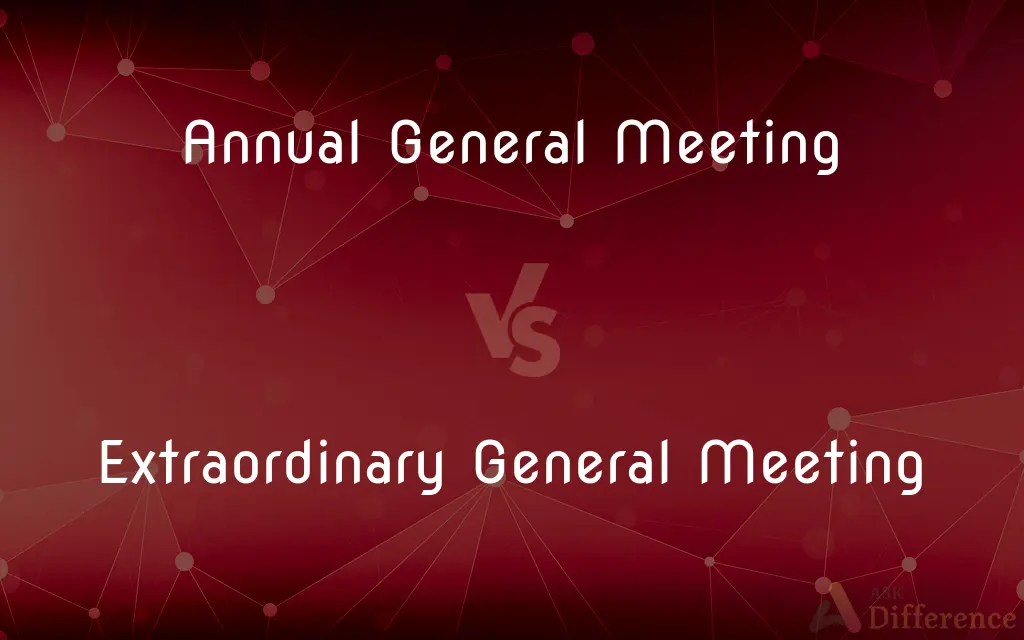Annual General Meeting vs. Extraordinary General Meeting — What's the Difference?
By Tayyaba Rehman — Published on December 29, 2023
Annual General Meeting (AGM) is a yearly gathering of shareholders; Extraordinary General Meeting (EGM) is called for special matters.

Difference Between Annual General Meeting and Extraordinary General Meeting
Table of Contents
ADVERTISEMENT
Key Differences
An Annual General Meeting (AGM) is a mandatory yearly meeting of shareholders. This event ensures transparency, allowing shareholders to receive updates on a company's performance and prospects. On the other hand, an Extraordinary General Meeting (EGM) is not scheduled regularly. It's convened to discuss urgent or exceptional matters that cannot wait until the next AGM.
The main purpose of an Annual General Meeting is to present annual accounts, approve dividends, and elect or re-elect directors. Shareholders can voice their concerns and questions at this meeting. In contrast, an Extraordinary General Meeting focuses specifically on matters that arise unexpectedly, such as significant acquisitions, mergers, or other business changes.
Each publicly-traded company is legally required to hold an Annual General Meeting. This ensures that shareholders are kept informed and can exercise their rights. However, the Extraordinary General Meeting is not a regular fixture but is called upon due to exceptional circumstances, ensuring that urgent decisions are made promptly.
All shareholders have a right to attend the Annual General Meeting. It's an opportunity to engage directly with the company's leadership. The Extraordinary General Meeting, while also open to all shareholders, is often more urgent in nature, given its purpose to address and resolve immediate or unusual issues.
To sum up, while both the Annual General Meeting and the Extraordinary General Meeting involve shareholder participation, the former is a scheduled, regular event with a broad agenda, and the latter is an ad-hoc gathering to tackle special matters.
ADVERTISEMENT
Comparison Chart
Frequency
Yearly
As needed, not regularly scheduled
Purpose
Present annual accounts, dividends, elect directors
Discuss urgent or special matters
Legal Requirement
Mandatory for publicly-traded companies
Convened as per exceptional circumstances
Attendees
All shareholders
All shareholders
Typical Agenda Items
Financial performance, dividends, director appointments
Urgent decisions like mergers, acquisitions, or other changes
Compare with Definitions
Annual General Meeting
Where company performance and strategies are discussed.
At the Annual General Meeting, new board members were introduced.
Extraordinary General Meeting
Ensures timely decision-making in emergencies.
The financial crisis warranted an Extraordinary General Meeting.
Annual General Meeting
A yearly gathering of a company's shareholders.
The company will present its financial reports at the Annual General Meeting.
Extraordinary General Meeting
Not regularly scheduled like AGM.
An unexpected situation led to the Extraordinary General Meeting.
Annual General Meeting
An event for transparency and shareholder rights.
Jane raised her concerns during the Annual General Meeting.
Extraordinary General Meeting
A meeting called for specific, urgent matters.
Due to the merger, an Extraordinary General Meeting was scheduled.
Annual General Meeting
A mandatory event for public companies.
Every shareholder received an invitation to the Annual General Meeting.
Extraordinary General Meeting
Convenes for exceptional business changes.
The proposed acquisition was the main topic of the Extraordinary General Meeting.
Annual General Meeting
A venue to present and approve annual accounts.
The dividends were approved during the Annual General Meeting.
Extraordinary General Meeting
A platform to address immediate company issues.
Shareholders demanded an Extraordinary General Meeting for clarity.
Common Curiosities
Who can attend an Extraordinary General Meeting?
All shareholders have the right to attend an EGM.
Is it mandatory for companies to hold an Annual General Meeting?
Yes, publicly-traded companies are legally required to hold an AGM.
Is it necessary to call an Extraordinary General Meeting if the matter is not too urgent?
No, if a matter can wait, it might be discussed in the subsequent AGM.
Is the agenda for the Annual General Meeting fixed?
While there are standard items like financial reports and director elections, other company-specific topics can be added.
Are minutes recorded for both AGM and EGM?
Yes, minutes are recorded for both types of meetings to maintain transparency and documentation.
What is an Annual General Meeting (AGM)?
It's a yearly meeting where a company's shareholders gather to discuss annual accounts, dividends, and other regular matters.
Do shareholders have a say in the decisions made during the Annual General Meeting?
Yes, shareholders can voice their concerns, ask questions, and vote on certain matters during an AGM.
How is an Extraordinary General Meeting (EGM) different from AGM?
EGM is convened for urgent or special matters and is not regularly scheduled like an AGM.
Why would a company call for an Extraordinary General Meeting?
To address urgent decisions or matters like mergers, acquisitions, or any unexpected business changes.
Can company performance be discussed in an EGM?
While EGMs focus on specific urgent matters, any related discussions about company performance can be included.
Can an issue be postponed from an EGM to the next AGM?
It depends on the urgency and significance of the issue.
How frequently is an Extraordinary General Meeting held?
There's no fixed frequency; it's convened as and when required.
Is voting rights the same for AGM and EGM?
Voting rights are typically based on shareholding and are consistent across both AGM and EGM.
Can non-shareholders attend an Annual General Meeting?
Typically, only shareholders or their proxies can attend, but companies may allow certain non-shareholders based on their policies.
What's the main objective of the Annual General Meeting?
To provide updates to shareholders, ensure transparency, and make regular annual decisions.
Share Your Discovery

Previous Comparison
Case Study vs. Ethnography
Next Comparison
Hydrostatic Pressure vs. Osmotic PressureAuthor Spotlight
Written by
Tayyaba RehmanTayyaba Rehman is a distinguished writer, currently serving as a primary contributor to askdifference.com. As a researcher in semantics and etymology, Tayyaba's passion for the complexity of languages and their distinctions has found a perfect home on the platform. Tayyaba delves into the intricacies of language, distinguishing between commonly confused words and phrases, thereby providing clarity for readers worldwide.












































